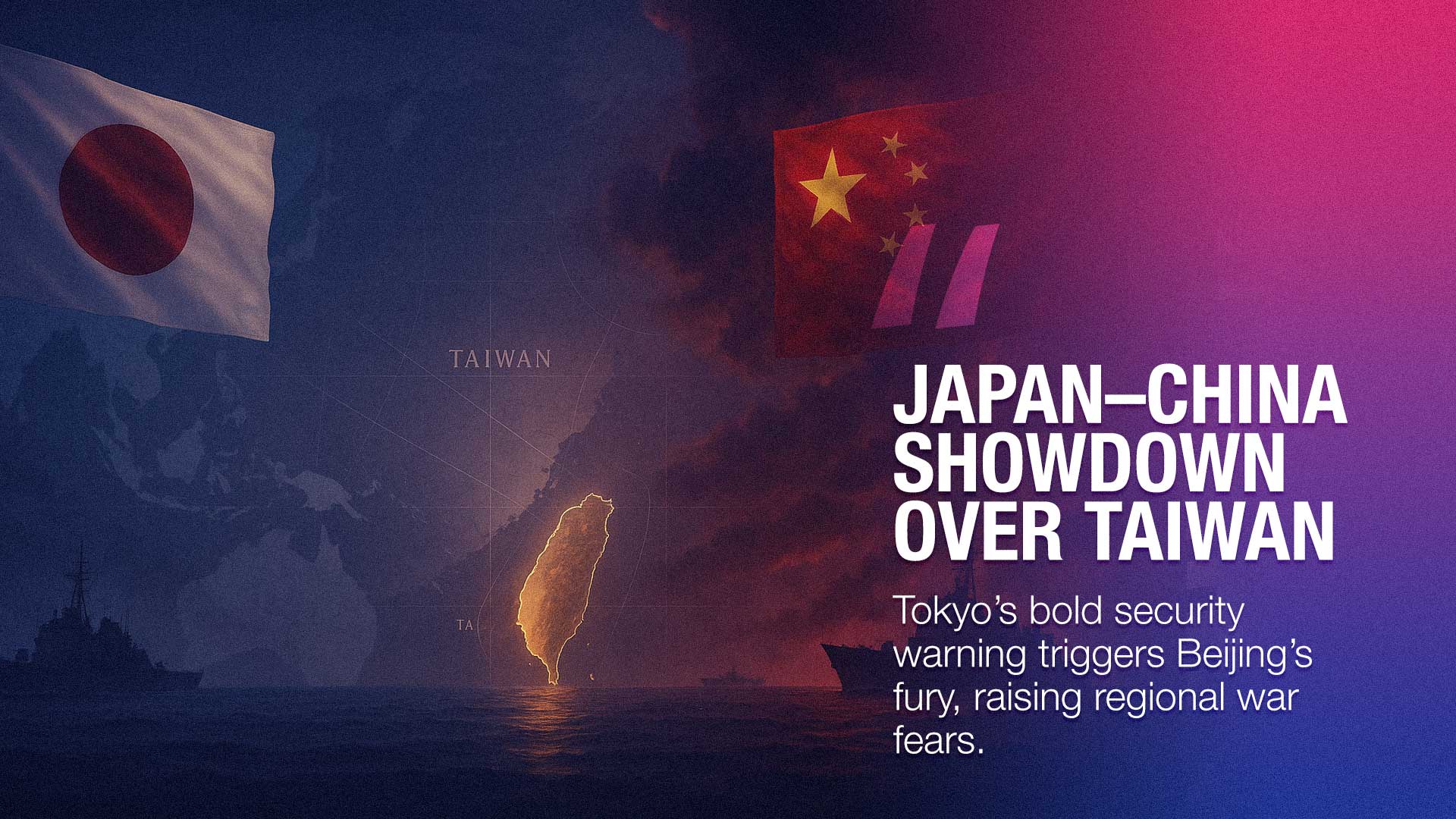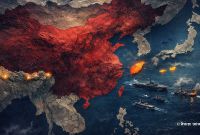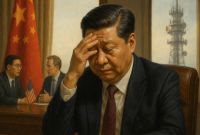Japan Defies Chinese Fury, Reaffirms Support for Taiwan’s Security

China’s anger over Japan’s growing engagement with Taiwan shows no signs of cooling. The latest provocation came when Japanese Prime Minister SanaeTakaichi reiterated Tokyo’s commitment to Taiwan’s security, warning that any attack on the island would directly threaten Japan’s survival.
On November 7, 2025, Takaichi told Japan’s Diet that “an attack on Taiwan would constitute a survival-threatening situation for Japan.” She outlined a scenario in which a Chinese maritime blockade around Taiwan could draw in U.S. intervention, spark a regional war, and create “an existential crisis” for Japan.
Under Japan’s 2015 security legislation, a “survival-threatening situation” allows the Self-Defense Forces (SDF) to act in collective self-defense, even if Japan itself is not directly attacked, a doctrine that has since become central to Japan’s evolving security posture.
Beijing’s reaction was predictably furious. The Chinese Consul-General in Osaka, Xue Jian, posted a menacing message on social media:
“If you go sticking that filthy neck where it doesn't belong, it's gonna get sliced right off. You ready for that?”
The post was later deleted, but Xue followed it up with another outburst:
“There are some foolish Japanese politicians out there spouting nonsense about a 'Taiwan contingency being a Japan contingency.' They must really want to die.”
China Condemns Japan’s Taiwan Engagement
This diplomatic flare-up followed Japan’s decision to hold a high-level meeting with a Taiwanese delegation on October 31, 2025, during the APEC Summit in Seoul. China accused Japan of violating the One-China Principle, calling the engagement “egregious in nature and impact.” The Chinese Foreign Ministrylodged strong protests after Japan referred to Taiwan’s envoy, Lin Hsin-i, as a “Senior Advisor to the Presidential Office of Taiwan” and publicly shared photos of the meeting.
During the meeting, Takaichihighlightedgrowing Japan-Taiwan economic and disaster-preparedness cooperation, emphasising that “Taiwan is a very important partner and a friend with close economic ties.” She called for further collaboration across multiple sectors and reaffirmed the importance of “peace and stability across the Taiwan Strait.” Lin responded by expressing hope for a stronger partnership between Tokyo and Taipei.
Tokyo Links Taiwan’s Security to Japan’s Survival
In recent years, Japan has redefined its security architecture to directly link Taiwan’s defence to Japan’s national survival, a major strategic shift. The 2022 National Security Strategy explicitly described China as Japan’s “greatest strategic challenge.” Takaichi, long known for her hawkish stance, has repeatedly warned that China’s rise poses “a direct threat to Japanese national security.”
Japan has also expanded defense spending, strengthened cooperation with the U.S. and the Philippines, and pursued partnerships through the Quad (U.S., Japan, India, Australia), all with an eye on countering Chinese aggression.
Beijing, however, continues to accuse Tokyo of “interference in China’s internalaffairs” and warns that Japan must “stop undermining the political foundation of China-Japan relations.” The Chinese Foreign MinistryclaimedTakaichi’s meeting with Taiwan’s representative “severely violated basic norms of international relations” and sent a “gravely wrong signal” to pro-independence forces in Taiwan.
China’s Contradictory Taiwan Rhetoric
On October 29, 2025, Peng Qing’en, spokesperson for China’s Taiwan Affairs Office, reiterated Beijing’s goal of peaceful reunification but added :
“However, we absolutely will not renounce the use of force and reserve the option to take all necessary measures.”
This hardline stance contrasts sharply with a recent series of Chinese state media articles that promised “benign rule” if Taiwan were to come under Beijing’s control. Such contradictions have only reinforced regional concerns about China’s unpredictability and coercive intent.
Taiwan, meanwhile, continues to gain strategic importance as a linchpin of Indo-Pacific stability. Lin Hsin-i’s meetings with both U.S. Treasury Secretary Scott Bessent and Prime Minister Takaichi in late October highlight growing trilateral coordination among democratic partners.
Diplomatic Fallout Between China and Japan
Ironically, Beijing’s protests over the Taiwan meeting came just one day after Takaichi met President Xi Jinping in person, their first encounter since she took office. Xi urged that China and Japan “should properly manage differences by focusing on the bigger picture,” but the incident has already strained the fragile goodwill between the two nations.
Tensions were also visible in separate diplomatic exchanges. Chinese Foreign Minister Wang Yi and Japanese counterpart Toshimitsu Motegispoke by phone earlier in the week, with Wang emphasizing that the Taiwan question remains a “fundamental issue” in bilateral relations. Similarly, when Defence Ministers Dong Jun and Shinjiro Koizumimet on the sidelines of the ASEAN Defence Ministers’ Meeting Plus in Kuala Lumpur on November 1, Koizumi expressed “serious concern” over Chinese military activity in the South China Sea and described the security domain as “the most challenging area” in Japan-China ties.
Japan’s Role in the Regional Balance of Power
Under Takaichi’s leadership, Japan has emerged as a frontline state against Chinese expansionism. Before assuming office, she met Taiwanese President William Lai Ching-te in April 2025 in Taipei to discuss cooperation in artificial intelligence and defence, and metForeign Minister Lin Chia-lung in July 2025 in Tokyo, and both meetings drew condemnation from Beijing.
Japan’s increasingly assertive security posture has reshaped East Asia’s power balance. Tokyo now sees Taiwan’s security as Japan’s security, a view shared by the United States and echoed by several regional partners.
China’s Global Overreach and Credibility Crisis
Beyond East Asia, China’s attempts to reshape global governance through initiatives like the Global Security Initiative (GSI), Global Development Initiative (GDI), and Belt and Road Initiative (BRI) reflect Beijing’s desire to replace the Western-led order. While these efforts aim to project China as a responsible global power, they have largely failed to gain trust.
China’s record of coercive economic behaviour, from punishing Australia, Lithuania, and the Philippines, to debt-trap diplomacy in Sri Lanka’s Hambantota Port, has eroded confidence in Beijing’s intentions. Its monopoly over rare earths and growing dominance in global supply chains provide leverage, but not legitimacy.
As the world’s second-largest economy, China wields immense influence. Yet its aggressive diplomacy and economic coercion have driven even once-neutral actors closer to Washington and Tokyo. Beijing’s missteps, particularly its threatening tone toward Japan and Taiwan, risk further isolating it in a region now increasingly united by the shared goal of deterring Chinese aggression.
Japan China



![From Kathmandu to the World: How Excel Students Are Winning Big [Admission Open]](https://nepalaaja.com/img/70194/medium/excel-college-info-eng-nep-2342.jpg)
